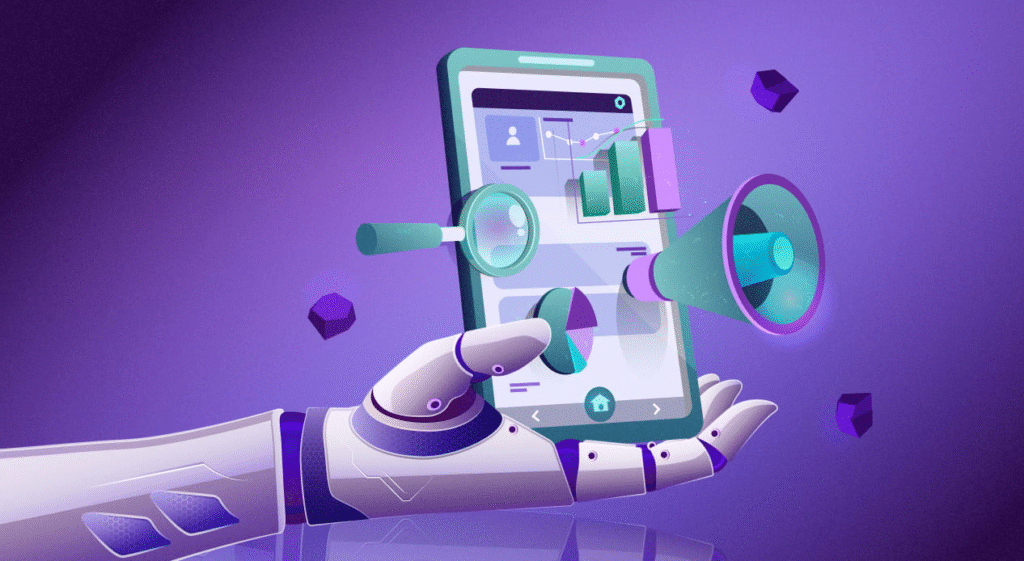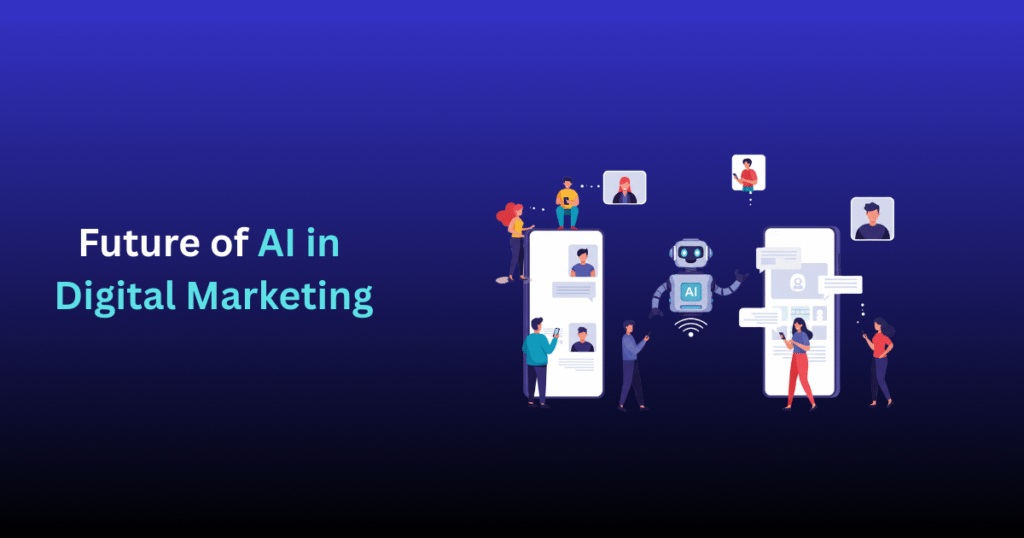
AI is quickly establishing itself as an essential player in nearly every industry, including marketing. Organizations trying to keep up in the modern, competitive online marketplace require AI marketing tools, such as those now utilized by enterprises, to learn more about their consumers and personalize experiences while improving campaign returns.
AI has recently emerged as one of the most important components in modern digital marketing. AI helps achieve goals swiftly and precisely by anticipating consumer preferences, enhancing ad effectiveness, and creating personalized customer experiences.
What is AI Marketing?
AI marketing is the adoption of revolutionary tools such as machine learning (ML), natural language processing (NLP), big data, and predictive analytics to enhance marketing strategies. AI-driven marketing differs from traditional techniques in that it leverages data, reacts to changes, and can produce highly specific outcomes.

Here are some real-life examples:
- Customer Data Analysis: AI looks at millions of data points to figure out what customers want to buy and how they act.
- Smart Suggestions: Sites use your browser history and interests to offer things.
- Dynamic Campaigns: Ads and email campaigns change on their own based on how customers respond.
- Content Automation: AI produces product descriptions, ad text, or social media posts that sound like the brand.
Amazon’s recommendation engine accounts for 35% of its sales and is widely recognized as an example of AI marketing. Spotify similarly creates custom playlists based on what people have previously listened to – giving consumers the impression that Spotify knows them better than they themselves do!
AI is not a substitute for human innovation; rather, it serves as a collaborator. Machines are great at doing math and spotting patterns, but people are better at understanding culture, showing empathy, and telling stories. This alliance makes initiatives that are effective, personable, and make a difference. Businesses that want to get better results can also use AI-driven campaigns together with a quality guest post plan to make sure their credibility and reach go beyond their own channels.
Major Benefits Of Integrating AI in Digital Marketing
Adopting AI has more benefits than just saving time; it transforms how firms grow.
1. Personalization At Scale
Epsilon says that 80% of customers are more likely to buy from a brand that gives them individualized experiences. AI makes this possible on a huge scale. For instance, Netflix suggests shows to viewers based on what they watch, while e-commerce sites advise things that customers are most likely to buy. These personalized encounters keep people interested and loyal.
2. Improved Customer Insights
AI analyzes client behavior more comprehensively than traditional analytics can. Predictive algorithms show which clients may leave, what products will become popular among buyers, and even how seasonal influences could alter decisions, providing businesses with insights to meet client needs before it’s too late.
3. Efficiency And Automation
AI technology takes over mundane administrative duties like email scheduling and optimizing ad placement to save marketers valuable time for strategic or creative work. Platforms allow them to run campaigns precisely while freeing them up for creative endeavors.
4. Higher ROI
AI cuts down on unnecessary spending by making sure ads go to the correct people at the appropriate time. McKinsey says that organizations that use AI in their sales and marketing get a 10–20% increase in ROI. In marketplaces where there is a lot of competition, this efficiency might mean the difference between success and failure.
AI Marketing Use Cases
AI is already changing industries in useful ways.
1. Chatbots And Virtual Assistants
AI-powered chatbots are available 24/7 to assist clients during the buying process. Sephora even has one that provides beauty tips and product ideas – creating the feeling of personalized shopping service!
2. Content Creation
AI systems provide fast and consistent writing solutions, speeding manufacturing while human input remains essential – in fact, The Washington Post used AI-generated short news stories so reporters could focus on longer pieces with greater depth.
3. Ad Targeting And Optimization
AI is a big part of platforms like Google Ads and Facebook Ads. AI ad generators and algorithms figure out which advertisements work best and move money to those ads automatically, which saves money and boosts conversions.
4. Customer Segmentation
AI lets you do micro-segmentation, which goes beyond just demographics. For example, a skincare firm may find and market to people who are interested in cruelty-free products, which would make the ads more relevant.
5. Predictive Analytics
Starbucks’ mobile app uses predictive analytics to customize drinks based on previous orders and time of day – this personalized touch keeps customers satisfied while encouraging repeat purchases.
The Future Of Digital Marketing With AI

The possibilities of AI in marketing are growing.
1. Hyper-Personalized Experiences
AI will make it possible to personalize things in real time. Think about getting buying suggestions that take into account not only your past purchases but also the weather, activities in your area, and even your mood. These changing encounters make marketing feel more like useful advice than sales.
2. Voice And Visual Search Optimization
It’s thought that half of all searches will be voice or visual by 2025. As tools get better, marketers need to make sure their sites are easy to find using natural language searches and image recognition. This change will change how SEO works and how products are described.
3. Ethical AI Practices
Companies using open AI will win greater customer trust, with customers being more inclined to remain with organizations that employ AI responsibly, such as by being fair, private, and open with their use.
4. AI in Marketing Automation
Future automation won’t merely follow timetables – it will alter them on the fly! AI-powered systems will make adjustments in real-time to campaigns to optimize not just timing but messaging, offers, and delivery channels as well.
5. AI In Customer Engagement
AI is changing the way brands talk to customers.
Coca-Cola utilizes AI to look at what people are saying on social media and figure out how they feel about it. Coca-Cola can change its advertising in real time to get more people to interact with it by knowing how people talk about their products.
Loyalty programs are another example. AI finds consumers who might stop doing business with you and gives them the correct rewards or deals at the right moment. This keeps people interested and builds relationships that last.
6. AI And Content Marketing
AI makes content smarter, but content is still the most important part of digital marketing.
- Content Creation: AI suggests articles, movies, or items that are relevant to users.
- SEO Optimization: Surfer SEO analyzes how competitors rank and how often keywords appear on pages to help boost your own ranking higher.
- Personalized Media: Netflix customizes even the thumbnails and trailers to fit the tastes of each customer.
AI not only makes content faster, but it also makes sure it connects with the proper people. Marketers may spend less time guessing and more time developing strong stories.
7. AI In Data-Driven Decision Making
Data has always been important for marketing, but AI goes a step further by converting data into insights in real time.
- Retailers can change prices on the fly.
- Travel businesses can plan ads ahead of time for when bookings will spike.
- E-commerce stores can predict returns, which keeps them from losing money.
AI makes decisions proactively instead of reactively, which lets businesses take advantage of chances before their competitors even notice them.
8. AI In Customer Experience And Loyalty
One of AI’s best features is that it makes the consumer journey better. Trust is built on a good experience, and loyalty is built on trust.
For instance, airlines utilize AI to send personalized trip information, track bags, and make upgrade offers through applications. Nike and other stores utilize AI-powered applications to suggest products based on what customers have bought in the past and their fitness objectives. This makes customers more loyal.
Loyalty programs are also getting smarter. AI can tell when users could cease using the service and deliver them personalized rewards. This makes customers feel that the brand cares about and understands them, which makes loyalty feel natural instead of forced.
Tips And Tricks To Implement Artificial Intelligence In Marketing
These measures will let businesses use AI without any problems:
- Start Small: Start with one tool, like a chatbot or predictive email campaigns.
- Leverage Data: Make sure the data is correct, thorough, and clear. AI can only be as good as the data it looks at.
- Choose the Right Tools: Choose the best AI tools that fit your business’s size and budget.
- Combine AI With Human Insight: Machines are fast and accurate, while people are creative and understanding.
- Stay Updated: AI changes quickly, so it’s important to keep learning and trying new things.
- Measure and Optimize: Monitor results, refine techniques, and use AI as an aid in finding ways to do better.
- Experiment With Predictive Models: Even tiny firms can start to guess how much demand there will be for seasonal items or repeat purchases.
Conclusion
Artificial intelligence is something we need now; companies that incorporate AI in their marketing can use this powerful tool to provide customized experiences to a large number of people, make predictions more accurately, work more efficiently, and foster closer customer relationships.
AI provides marketers with all of the tools needed to craft experiences that bring customer joy while increasing profits. Such tools may include chatbots, predictive analytics, hyper-personalization, and dynamic content production – with plans which combine AI’s ability to analyze data with human creativity to produce campaigns which are both intelligent and emotionally impactful.
As AI technology improves, companies that utilize it early and responsibly will set new norms for great marketing strategies. Indeed, AI is shaping marketing now, not just its future.
Read Related Articles:
15 Best AI Email Marketing Tools to Try in 2025
19 Essential AI Content Marketing Tools for Every Business
12 Best AI Tools for Affiliate Marketing That Every Marketer Needs to Know
14 Best AI Tools for Influencer Marketing to Enhance Your Influencer Campaign
